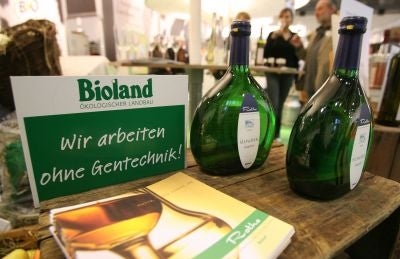Your support helps us to tell the story
From reproductive rights to climate change to Big Tech, The Independent is on the ground when the story is developing. Whether it's investigating the financials of Elon Musk's pro-Trump PAC or producing our latest documentary, 'The A Word', which shines a light on the American women fighting for reproductive rights, we know how important it is to parse out the facts from the messaging.
At such a critical moment in US history, we need reporters on the ground. Your donation allows us to keep sending journalists to speak to both sides of the story.
The Independent is trusted by Americans across the entire political spectrum. And unlike many other quality news outlets, we choose not to lock Americans out of our reporting and analysis with paywalls. We believe quality journalism should be available to everyone, paid for by those who can afford it.
Your support makes all the difference.Europeans won't be able to find any bottles of wine with an 'organic' wine label anytime soon, according to Copa-Cogeca, the voice of European farmers and agriculture cooperatives, in a June 17 release.
Presently organic winemakers can only label their wines as being made from 100% organically grown grapes.
The EU was to vote on a new set of standards that would have led to an organic category for wine and new label.
However Dacian Ciolos, the EU Commissioner for Agriculture & Rural Development, decided not to pursue the new label.
Agra Europe, a respected European agriculture policy news source, stated the reason the EU Commission "has withdrawn plans for an 'organic wine' label" is based on "member states fail[ing] to agree on the conditions for using it."
Pekka Pesonen, the Secretary-General of Copa-Cogeca, disappointed in the news said, "EU legislation on organic wine is urgently needed in order to harmonise rules on organic wine at EU level and to develop the market for this product, especially since there is increasing demand for it."
"We believe that the definition of organic wine should conform to the objective and general principles of organic agriculture, notably quality; respect of the environment and protection of human health. These concepts must apply to the whole process of organic wine production, from the vineyard to the bottle. The difference between organic and conventional wine cannot be limited to the grape production," continued Pesonen.
Ciolos maintains that the "new concept" has been shelved at the moment but is hopeful the Commission will revisit the plan in the future.
In February 2010, the largest international organic wine event, MUNDUSvini BioFach International Organic Wine Award, took place in Nuremberg, Germany with 622 organic wines from 18 countries.
And, in California's Napa Valley, the Napa Vintners have volunteered to implement sustainable business practices with ambitious goals to protect ecosystems and the land through Napa Green Land and Winery Certifications.
Although all of the researchers, policymakers and winemakers who spent years crafting the European wine label proposal are frustrated with its current status, many believe it is only a matter of time before the EU sets an industry standard and guideline for organic wines.

Join our commenting forum
Join thought-provoking conversations, follow other Independent readers and see their replies
Comments